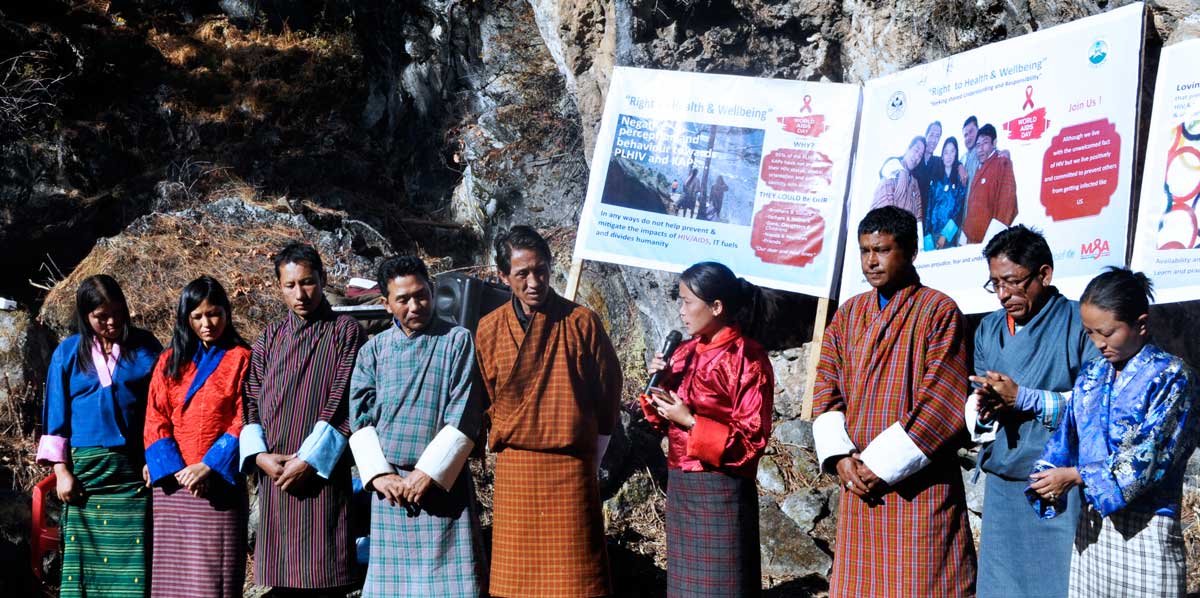Enhancing Access to Community-Based Care, Shelter, and Livelihood Opportunities

The integration of a community-based care shelter with a livelihood facility is a pivotal solution for individuals living with HIV/AIDS (PLHIV), who confront a spectrum of challenges and disadvantages. Lhak-Sam’s Livelihood Centre currently extends shelter to individuals from disadvantaged family backgrounds, often constrained by self-limiting beliefs and a dearth of growth opportunities. Many have been compelled to leave their native communities due to stigma and discrimination, wrestling with both securing a dignified living and battling health concerns. Some individuals were sick and abandoned, while others are grappling with alcohol dependency. The disconcerting findings of a 2022 study involving 239 PLHIV are a wake-up call: 36.4% are illiterate, 41.4% are unemployed, and a staggering 25% live in poverty (BLSS 2017). The extent of stigma they face surpasses the threshold set by the global AIDS strategy of <10% (2010-2016). These figures project an escalating demand for shelter and livelihood support at the centre as PLHIV age with HIV. Among the surveyed individuals, 82.8% (n=198) are married and collectively have 297 children, some of whom have lost parents to AIDS and are reliant on extended family members for care and support.
Currently, the centre provides permanent housing to 18 individuals, including six children affected by HIV/AIDS. These children’s parents are employed at the Lhak-Sam super interlocking earth hollow brick production factory, and the children attend the nearby Gewog School, conveniently situated within a ten-minute walk from the centre. In addition to their brick factory jobs, parents engage in activities such as managing an orchard, land development, and running a greenhouse for organic vegetables.
The centre’s location is well-connected with roads, electricity, and the internet, and abundance of red soil, ideal for brick production. The area is complemented by natural manure from nearby forest, aiding in cultivating organic produce. Nestled between two villages amid mountains and serene pine forests, the five-acre land gifted by the royal government of Bhutan in 2017 is a haven of tranquility. As demand grows, our aim is to expand and accommodate up to fifty individuals, including children, by the second quarter of 2024.
Individuals who meet shelter criteria are assigned family or bachelor quarters, supplied with bedding and cooking utensils as needed. Meals are self-sustained through the modest wages earned at the brick factory. The centre’s manager, supported by the dedicated outreach department, provides crucial healthcare services, including regular health check-ups, medication replenishment, nutritional support, and peer counseling. Participation in organizational events and program activities cultivates knowledge, confidence, and interpersonal bonds, lessening isolation, fear, and self-stigma. These efforts not only enhance treatment adherence but also nurture a determination to lead fulfilling lives. We firmly believe that addressing these challenges is pivotal in preventing sickness, discrimination, and mortality within this vulnerable population while curbing HIV transmission. Compassionate interventions can undoubtedly bring transformative change to those who need it most.
However, housing facilities at the centre remain in their original hut-based state due to various constraints. To rectify this, bolstering the brick production factory is vital, necessitating an increase in capacity, quality, and market presence. If the machine could be fully automated the super-compressed interlocking earth hollow brick manufacturing machine has the potential to yield 12,000 bricks daily. Presently, with a team of nine individuals, our output averages around 900 bricks per day. However, production is hampered by proper and insufficient soil storage and bricks curing sections, impacting both capacity and product quality for effective marketing. These two programs must evolve synergistically, breathing hope and dignity into the lives of these disadvantaged individuals.
As individuals become adept at operating the machinery and mastering quality brick production, Lhak-Sam will channel efforts into honing marketable skills that align with their capacities and the market demand. Customizing these programs to suit the local context, acknowledging Bhutan’s cultural, social, and economic dynamics, is pivotal. Collaborating with the relevant ministry ensures alignment with national development goals and resource allocation, guaranteeing the enduring sustainability and efficacy of these programs.
